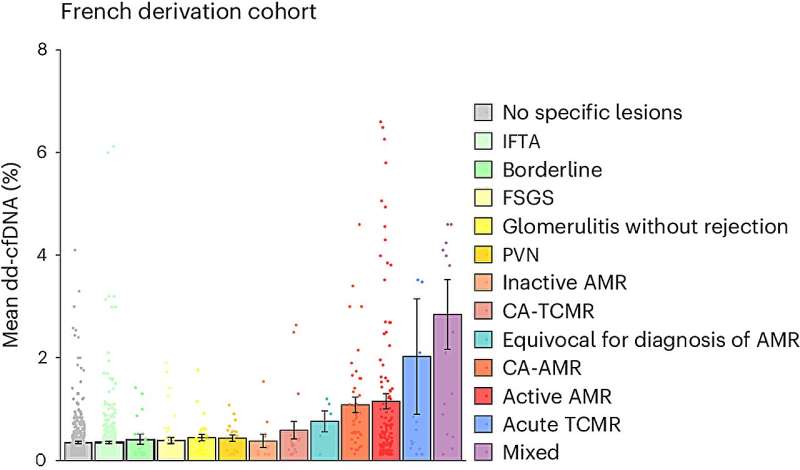This article has been reviewed according to Science X's editorial process and policies. Editors have highlighted the following attributes while ensuring the content's credibility:
fact-checked
peer-reviewed publication
trusted source
proofread
DNA fragments help detect kidney organ rejection

Findings from a study published in Nature Medicine show that donor-derived cell-free DNA (dd-cfDNA), also called liquid biopsy, has the potential for early detection of kidney transplant rejection.
The international study enrolled a diverse population of nearly 3,000 kidney transplant recipients—both adult and pediatric—from 14 transplantation centers in Europe and the U.S. The Department of Pediatrics at Washington University School of Medicine in St. Louis contributed one of the two pediatric datasets involved in the study.
When cells undergo apoptosis or necrosis, they release small fragments of DNA, known as cell-free DNA (cf-DNA), into the bloodstream. In inflammation associated with transplant rejection, dying cells release donor-derived cell-free DNA (dd-cfDNA). Researchers found those dd-cfDNA levels were strongly correlated with different types of transplant rejection, including antibody-mediated rejection, T cell-mediated rejection and mixed rejection. The study found similar accuracy in children and adults.
Often unnecessary and invasive graft biopsies are currently considered the "gold standard" in diagnosing transplant rejection, but dd-cfDNA could provide a non-invasive, accurate biomarker to reduce the need for biopsy.
Washington University School of Medicine in St. Louis researchers Raja Dandamudi, MD, assistant professor of Pediatrics, and Vikas Dharnidharka, MD, MPH, professor of Pediatrics, contributed to the study, led by researchers from the Université Paris Cité and doctors from the Assistance Publique—Hôpitaux de Paris.
"Many studies of newer biomarkers to detect acute rejection in kidney transplants are not very large and cannot study various sub-populations, limiting their generalizability," Dharnidharka said. "This work was a very large international collaboration. The analyses demonstrated that dd-cfDNA improves the acute rejection detection beyond our standard of care monitoring, including in subpopulations of transplant recipients who are of African ancestry or of pediatric age."
Tarek Alhamad, MD, MBA, MS, professor of Medicine at WashU Medicine, contributed adult kidney transplant data to the study's dataset. Alhamad said, "This paper advances our understanding of the benefits of using cf-DNA as a biomarker for rejection and outcomes in the field of kidney transplantation."
While biopsies will continue as the method of rejection diagnosis, dd-cfDNA may improve early rejection diagnosis and enhance the care of kidney transplant recipients.
More information: Olivier Aubert et al, Cell-free DNA for the detection of kidney allograft rejection, Nature Medicine (2024). DOI: 10.1038/s41591-024-03087-3



















